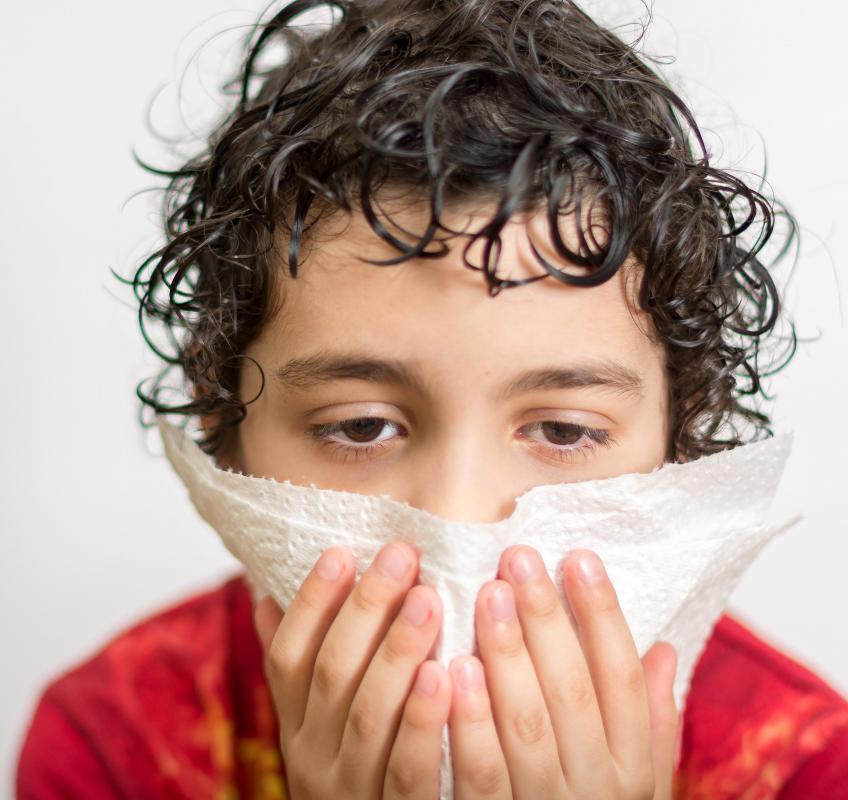At TheHealthBoard, we're committed to delivering accurate, trustworthy information. Our expert-authored content is rigorously fact-checked and sourced from credible authorities. Discover how we uphold the highest standards in providing you with reliable knowledge.
How do I Tell if I Have an Allergy to Amoxicillin?
You may develop a range of symptoms that indicate you have an allergy to amoxicillin. For example, you may develop hives or other skin reactions as a sign that you have an amoxicillin allergy. You may also experience respiratory changes in relation to such an allergy. Cardiovascular and gastrointestinal symptoms may develop as well. Since allergic reactions that include facial swelling, cardiovascular symptoms, or respiratory changes can be life threatening, immediate medical attention should be sought if they develop.
One of the primary signs of an allergy to amoxicillin is a skin reaction. For example, if you have an amoxicillin allergy, you may get hives while you are taking it. Hives are marked by reddened or whitish bumps or welts that develop on the skin and often cause intense itching. Sometimes an allergic reaction to this antibiotic is marked by a different type of rash, however. The rash is usually red, itchy, and marked by smaller bumps; it may sometimes cause enough irritation to be considered painful.

If you are allergic to amoxicillin, you may also develop symptoms in the area of your face. For example, your lips may swell, your cheeks may appear swollen, or your entire face may seem swollen and puffy. This is a sign of a serious allergic reaction that requires swift medical attention. Most medical experts recommend going directly to the emergency room in the event that you develop these symptoms.

Respiratory changes may also develop as a sign of an allergy to amoxicillin. For example, you may notice difficulty breathing in relation to this type of allergy or develop a cough that is not related to a cold or the flu. You may become hoarse or develop nasal congestion. Sneezing may even develop as a sign of an amoxicillin allergy.
You may also experience cardiovascular changes when you have an amoxicillin allergy. In such a case, you may suffer a severe drop in blood pressure, feel dizzy, or even faint. In some cases, your heart may beat too rapidly or irregularly when you are suffering from an allergic reaction to this drug. You should seek medical attention for any of these allergic responses as well.

Sometimes an amoxicillin allergy may cause more general symptoms. For example, you may suffer from gastrointestinal upset with an amoxicillin allergy, which may include nausea, vomiting, and diarrhea. You may also notice tingling sensations or have difficulty swallowing. You may even develop anxiety and confusion as signs of an allergy to amoxicillin.
AS FEATURED ON:
AS FEATURED ON:














Discussion Comments
My son is on amoxicillin now and the last time he took it, it seemed he got an infected gland and it did bother him. Does this mean he is allergic or should I consider it just a side effect? How would I treat this? Should I ask for something different?
Wow, my cousin has food allergies, and the symptoms are the same! I didn't know that it was possible for a medication to make a person react the same way as they do when eating peanuts or strawberries and having an allergy.
@JackWhack – It might have to do with amoxicillin dosage level, too. If you had a lower dosage, you might not feel as queasy, but then again, it might not be enough to knock out your infection.
My mother cannot take amoxicillin because it makes her so nauseated that she cannot function. I can take it, but I don't like to, because it makes everything that I eat or drink taste metallic and bitter. I can't even enjoy a glass of water because of this.
However, it has knocked out many of my urinary tract infections. So, I don't tell my doctor to give me something else, because I know for a fact that amoxicillin works.
I know that nausea and vomiting are considered common side effects of amoxicillin, but these are two things that I cannot handle. Some people can take being a little bit sick to their stomachs in order to take the medicine that will get rid of their infections, but I just can't do it.
I wonder if these are just two signs of a mild allergic reaction to the drug. I believe that hives and difficulty breathing are much more serious and are definite reasons for quitting it.
@Azuza - That's a good idea. It's also a good idea to read the insert that comes with your amoxicillin antibiotic. I know a lot of people don't bother, but they really do contain good information. In fact, the inserts usually tell you what to watch out for as far as allergy symptoms.
I had no idea there were so many amoxicillin allergy symptoms. I always thought if you had an allergy to a medication you either developed hives or developed anaphylaxis (where you swell and your throat might close.) But it sounds like an amoxicillin allergy can manifest itself in a bunch of different ways.
I don't take antibiotics often, and as far as I know I don't have any allergies. However, next time I have to take something I'm going to pay close attention to how I feel after taking it.
@dautsun - I'm allergic to amoxicillin myself. At first, I just thought I was having amoxicillin side effects, so I kept taking it. However, when I called my doctor, he told me that developing a rash and feeling faint isn't a normal reaction to amoxicillin and to stop taking it immediately. Now my doctor prescribes me other antibiotics if I get sick.
I'm actually allergic to several kinds of antibiotics. I have a penicillin allergy and amoxicillin bothers me too. I gather that this is pretty common, because the two drugs are very closely related. Also, there are several other drugs that have an allergy crossover rate with penicillin I have to avoid.
I'm very lucky though, because I just get hives and a very upset stomach. As the article said, an amoxicillin allergy can cause a very severe reaction that can be life threatening. I'm glad that didn't happen to me when I took penicillin or amoxicillin.
Post your comments